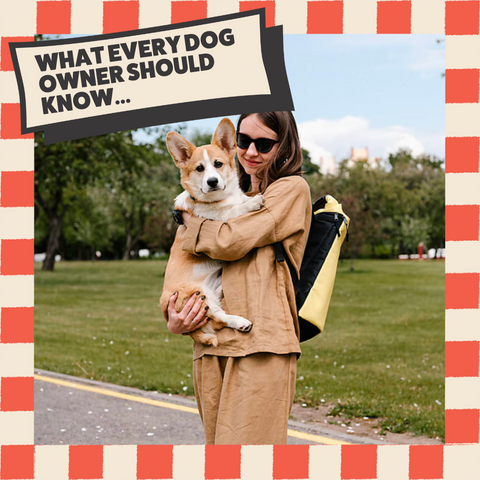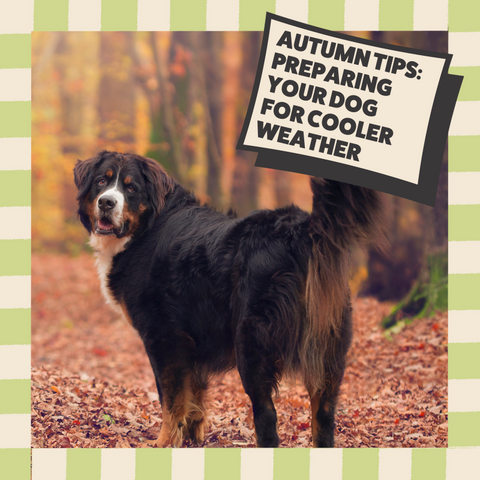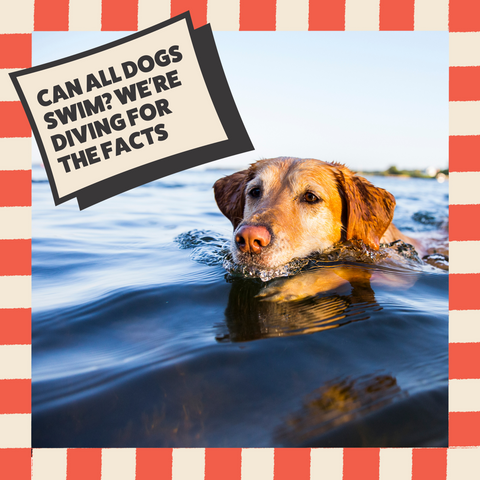The Slobber & Chops Puppy Guide:
|
At Slobber & Chops we absolutely love puppies and want to help you and your new pup get off to the best possible start in life!
The Slobber & Chops Puppy Guide is a helpful resource packed with tips to make welcoming your new puppy home a breeze. From puppy-proofing and socialisation, to finding the perfect dog groomer and selecting the right food, we’ve got you covered!
Just like us, dogs come in all shapes and sizes. As they grow and you get to know them better, you’ll discover their unique personality, what they love, and what motivates them. Along the way, you’ll also learn more about your puppy's needs.
To help you get started, we’ve put together some top tips and things to consider, from before your puppy arrives to their first days, weeks, and months at home.
This Guide Contains:
Before You Bring Your Puppy Home: Puppy Admin and Preparation
First off, congratulations on your exciting decision! You’re well on your way to welcoming your new furry family member. The Slobber & Chops Puppy Guide is here to help you create a clear plan and cover the basics as you prepare for your new dog's arrival.
Finding A Vet: Choosing the right vet is crucial for your puppy’s health. They’ll guide you on future appointments and offer advice on care. Start by researching online reviews, asking for recommendations from friends, family, and breed-specific groups.
Location and Accessibility: Consider how easy it is to get to the vet. Check for convenient parking, pet-friendly bus routes, and accessibility, especially if you need to travel during an emergency.
Reviewing Your Shortlist: Visit or call your shortlisted vets. Ask about:
- Emergency and out of hours care.
- Pricing and annual care plans (check ups, flea treatments, worming).
- Insurance claims and additional services.Once you have decided on the right vet for you:
Once You’ve Chosen Your Vet: When you’ve selected the right vet, make regular visits to help your puppy build a positive association. If the vet is close enough, include visits during your regular walks.
Your puppy will typically have their second vaccination around 12 weeks, and you can also consult with your vet about worming, flea treatment, and neutering. Many vets are happy to discuss a healthcare plan with you, covering annual care needs like vaccine boosters and other essential treatments.
Micro-chipping & Dog Tags:
Since 6 April 2016, UK law requires all dogs over 8 weeks old to be microchipped. Each chip has a unique number stored in a central database, allowing your dog to be identified if lost. This should be done by the breeder, who will transfer the details to you- ensure you have the paperwork when collecting your puppy.
Owners of dogs and puppies over 8 weeks must register their pet’s microchip details with an authorised database and keep the information up to date.
Additionally, dogs are still legally required to wear a collar and tag with the owner's name and address in public. We recommend not using your dog's name on the tag.
Find A Dog Groomer:
Finding a dog groomer is particularly important if you have chosen a puppy that has a longer coat that will require regular maintenance. This is especially true of dogs like poodles, and poodle crosses like Cockapoos and Labradoodles.
Much like choosing a vet, seek out recommendations and then visit the groomer where possible. Asking these questions can help you decide which groomer is right for you and your dog.
- What is their experience, and do they hold any qualifications?
- Do they have experience with your breed?
- What is the number of dogs per dog groomer at one time?
- Are you insured?
- How much will the dog groom cost?
- What is included in the price?
- How long will the groom take?
About The Dog Grooming Industry:
Dog grooming is currently an unregulated industry in the UK, meaning anyone can offer grooming services. The RSPCA advises looking for "qualified dog groomers" to ensure skill and reliability.
The ideal qualification is a "Level 3 Diploma," but with many courses available, it can be tricky to know what to look for. Reputable groomers will proudly show their certificates. A good grooming salon will discuss their team’s qualifications and training practices. Junior or less experienced staff should be working toward formal qualifications, with senior staff holding significant, verifiable qualifications.
Any reputable dog groomer will be happy to show you their certificates as they will be proud of the hard work they have put in to gain their qualifications. This is quite straightforward with individuals who groom dogs alone but what about dog grooming salons and parlours?
A good dog grooming salon or parlour will be happy to discuss the team who work there and how they ensure the highest quality of dog grooming. This might be with in-house or ’on the job’ training and junior or less experienced staff may well be (and ideally should be) working towards a formal vocational qualification. Senior and experienced staff, who should always be present, should have a significant qualification they can both explain and prove.
Puppy Classes and Training:
We always recommend completing a set of puppy classes as it will make you a more confident puppy parent, while also helping your puppy socialise and learn the skills and behaviours which will stay with them for life.
Consider training classes for you and your dog. Most local dog trainers offer puppy classes and you can move on to obedience training. This is key to helping you and your dog develop the necessary skills for a happy life at home and out in the big wide world. This includes working on recall and walking to heel, both very important to retain control of your dog while they are ‘off lead’.
A recent #dogkind survey from the RSPCA shows that 18% of dogs never walk off lead.
Pet Insurance:
Research and organise pet insurance. This can be complicated so make to time to read, plan and budget. Finding the right plan for you and your puppy will take time and look at the costs & excess amounts on a claim. Ask for recommendations, and for a clear, unbiased guide on the terminology and jargon, check out this excellent page from Which.
https://www.which.co.uk/money/insurance/pet-insurance/pet-insurance-explained-a8td63l18gsw
Essential Reading
Gwen Bailey's bestselling book “The Perfect Puppy” has helped hundreds of thousands of owners throughout the world raise a problem-free dog.
From house training to playing games, it will show you how to teach your dog good manners and build their confidence with the world around them. There are step-by-step training and socialisation plans as well as a guide to understanding and preventing biting, chewing and other problems.
https://www.amazon.co.uk/Gwen-Bailey/e/B001ITTP08/ref=dp_byline_cont_ebooks_1
Puppy Proofing & Preparing Your Home:
Puppies are natural explorers so check out the Slobber & Chops checklist for puppy-proofing and preparing your home for your new arrival!
As a new pet parent, you will need to provide a safe environment for your newest family member. Preparing your home and garden for them carefully. This is similar to doing so for a curious toddler, you want to eliminate any dangers for them.
Your puppy will want to investigate every inch of their new home and sometimes they won't distinguish between their new toy and some shoes. This can be daunting, especially for first-time pet parents but we're here to help!
Top Tips for Preparing Your Home For A New Puppy:
- Create a safe space for your puppy to play, and provide toys to keep them stimulated.
- Having a puppy crate/playpen for house training and securing the puppy for short periods of time.
- You may want to use a stair gate/ door gate to limit where your puppy can access.
- Having a cosy washable bed in a quiet, draft-free place where your puppy can rest undisturbed.
- Getting food and water bowls that are suitable for your puppy’s size.
- Getting stocked up with toilet training aids and pet-safe disinfectants to help cope with those little accidents.
- Dog proofing your car and getting a transporter, or car harness for driving safety.
- Invest in appropriate dog grooming tools for the breed of your puppy. Consult a local groomer for advice on the requirements for breeding.
- Think like a puppy! Look for small objects and tassels that can be removed to prevent chewing and choking.
In addition to this, clear coffee tables and low surfaces and think about packing away breakables like vases for the time being. Tails can be just as involved as noses and paws!
Children And Visitors:
Prepare the family by agreeing on 'House Rules' that work for everyone. For example, feed the puppy only at meal times, avoid human food, keep puppies off the furniture, and keep bedroom doors closed. Consistency is key, so agree on basic commands like "Sit," "Wait," or "Stay" for everyone to use.
Inform regular visitors, such as delivery people, medical assistance, cleaners, and neighbors, about your puppy's arrival. Let neighbors know in advance to explain any noise and potential short-term disturbances.
If you live alone, plan early visits from friends to help socialize your puppy and talk to visitors about training rules. Teach children and visitors to stand still if the puppy gets too playful and to ask for help when needed.
Puppy Proofing Every Room:
Although your puppy may have a main room they stay in, it's important to puppy-proof the entire living space for both your peace of mind and your puppy's safety.
- Consider electrical outlets and protectors, as well as charging cables and cord covers to protect from chewing.
- Some houseplants can be poisionous. A quick search online should let you know if plants are dangerous and should be removed or put out of reach.
- Pack up chemicals and your medicines, think about things like toilet bleach, and medicines on bedside tables or countertops. Safety caps are not always enough once sharp teeth are involved!
- Beware of batteries in things like car keys, remote controls, phones, watches, and children's toys. All such items should be kept well out of reach, as small batteries can be swallowed and be extremely dangerous.
- Rubbish bins can also be remarkably interesting and potentially very hazardous to your puppy.
Puppy Proofing Your Garden & Outside Space:
One final note on puppy proofing is to consider your outside space. Is it secure for the puppy?
- Either create a dedicated and fenced-off dog run, or fence off and secure the hazards in your garden. These hazards could include ponds, flowerbeds, swimming pools and hot tubs. For smaller dogs consider a mesh barrier/fencing.
- Check all your garden products, as some, like slug and insect pellets, can be highly toxic to dogs. Store them safely or dispose of them properly. Also, keep antifreeze and rock salt away from pets, as they are extremely dangerous and can cause severe poisoning or even be fatal.
- Secure all gates and consider fitting self-closing devices and secure latches.
- Put signs on entrances and exits reminding people to secure these points and warning them of the presence of dogs.
Puppy Socialisation Guide: The Basics
Socialisation is crucial for your puppy’s development. A well-socialised puppy grows into a confident, well-adjusted dog. The more effort you put in now, the better the long-term benefits for both of you.
The early weeks (12-16 weeks) are vital, known as the “socialisation period,” where you’ll want to expose your puppy to various sights, sounds, and experiences. Gently introduce them to new people, sounds, and objects at their own pace, always keeping things positive. Puppies lacking socialisation may develop fears of new environments and experiences.
Socialisation: The Basics
Gentle, low-key introductions to children are best, trying to keep the experience as calm as possible, perhaps asking children to sit down and give the puppy as much space as needed. If your friends have healthy, fully vaccinated puppy-friendly dogs, you may choose to introduce them before your puppy’s vaccinations, but please take advice from your vet on this.
Carry your puppy outside to introduce them to new people, sights, and environments, such as busy roads or shops. Gradually introduce them to the car, being handled and having their ears, eyes and other body parts checked regularly. Ask your preferred groomer how you can help prepare them for grooming during this time.
Dogs don’t typically touch each other, so it's important to teach your puppy to enjoy being touched. Familiarising them with human touch, handling, and restraint will reduce stress in the future. Use toys and treats to reward positive behavior and distract them from chewing on you. This makes future grooming and vet visits much easier, and you can even bring a toy to the vet for comfort.
Puppy’s First Days At Home
The first few months of a puppy's life are a crucial time for learning and development. During this period, nerve pathways are formed and can only be retained through continued use.
This means that the variety of experiences your puppy encounters during this time plays a significant role in shaping their brain.
Taking full advantage of this phase by socializing and teaching your puppy as much as possible is essential for their development into a well-rounded adult dog.
Puppy's First Night:
Puppies and dogs are pack animals and can whimper and cry when they are first separated from their mum and siblings. At this stage, they are not used to being on their own. For the first few nights, you might want to have your puppy in a large open box or crate which they can’t crawl out of in your bedroom. This may help them to get used to being on their own and can aid toilet training.
Make sure your puppy is as tired as possible before bedtime, with games, and training. When you settle for bed try not to fuss over every whimper or murmur but be prepared to get up for a trip to the toilet without too much attention.
Some people like to set an alarm for the first few nights and take the puppy out every 2 hours. While this might sound daunting it helps to reduce your puppy's stress and aids in the toilet training process.
Puppy Toilet Training:
Puppies need constant supervision for the first two or three weeks. To help toilet train your pup take him/her outside to the same spot frequently. Ensure they go out after each feed, after playing, first thing in the morning, last thing at night, basically at least once an hour. You should stay with them, so get that coat and umbrella at the ready!
There’s no need to stay out for hours if it doesn’t look like they are going to the toilet, stay for a few minutes and if nothing is happening take them back in and try again later. Consistency from you and your family will help.
It is best to allow them to wander around, when you see they are about to go use the same cue phrase such as ‘Go Potty’ or ‘Be Clean’ and use the phrase consistently every time. When they have been to the toilet, praise them enthusiastically to make that little tail wag.
Top Tips For Puppy's First Days:
- As frustrating as it may be, we try not to be angry if there’s been an ‘accident’ in the house. This could cause them distress and result in them not wanting to go to the toilet in front of you at all.
- Dogs naturally communicate with other dogs using body language, which means they naturally understand human gestures and body language better than spoken words.
- Continually praise and reward your puppy immediately when they show good behaviour.
- When petting your puppy have a toy to hand that they can mouth, as puppies often with their mouths. A toy will help them learn that they play with humans with a toy and not chew or nibble on our hands and feet.
- While puppy behavior may be cute, think about the future. Jumping, nipping, or pulling can become undesirable as an adult. Encourage good behavior consistently and ask friends and family to help by not reinforcing unwanted actions.
- Your puppy needs to recognize you as the leader. You can reinforce this by controlling access to food, toys, and the outdoors, as well as winning more often in games like tug of war. To keep things fresh and engaging, rotate toys every few days. Removing toys from play will also help establish your role as the pack leader.
Puppy Playpen:
A puppy playpen or crate provides a safe, relaxing space for both you and your puppy, allowing them to be separated from other animals and children. Ensure they have enough room for sleeping, playing, and toileting if needed.
A bed and a couple of toys are essential to help your puppy settle.
Keep in mind, this should not be used as a long-term confinement area; rather, it's a safe space where your puppy can learn to relax and be alone when not receiving attention.
Make sure the playpen remains a positive, calm environment dedicated to your new puppy.
Puppy Grooming
All puppies will require grooming of some kind and this is largely dependent on the breed of your puppy. Talking to a qualified, local groomer or consulting with our grooming team at Slobber & Chops will help you develop the best plan to ensure you and your puppy enjoy a lifetime of grooming.
The Introductory Puppy Package at Slobber & Chops:
This will help your puppy get comfortable with the grooming process after their second vaccinations. Over four weekly sessions, your puppy will be gradually introduced to the salon environment in a fun and stress-free way, ensuring a positive grooming experience as they grow. The package includes desensitisation to the grooming space, handling of grooming tools, baths, blow dries, nail clipping, and basic trims. By the end, your puppy will be ready for future grooming sessions with confidence. You'll also receive a Welcome Pupper Hamper, with grooming tools, premium food samples, and a Licki mat.
Grooming is great for every dog and not just when they are muddy, it also has health benefits too!
A Healthy Start To Dog Grooming:
Grooming provides several health benefits for your dog. Brushing removes loose and damaged hair, a process called ventilating the coat, which helps maintain a healthy and strong coat. Regular brushing also acts as a gentle massage, promoting healthy blood circulation and stimulating the skin.
Grooming helps your puppy's skin breathe while reducing the buildup of grease and grime, preventing irritation, itching, and skin problems. Over time, gentle grooming, combined with regular brushing and handling at home, will make the experience more comfortable for your puppy. It should become a soothing, positive, and relaxing routine for both of you.
Matting and Knots:
Longer coat breeds and doodle breeds, such as cockapoos, can often experience matting in their fur. When a dog moults or sheds, the loose hair can get tangled which causes matting. If not brushed away regularly, these mats continue to develop. Mats are not just knotting of the hair but can build up to cause discomfort and damage.
Mats that form close to the skin, particularly around the joints, can pull on the skin and create painful sore patches and/or cause distress to the dog. It is possible for these patches to develop sores and for these to get infected causing serious complications.
Regular Grooming & Choosing A Style:
Regular grooming provides both you and your groomer with the chance to perform a basic health check on your puppy. During grooming, they can check for matting, sores, and clean between the toes, where mud and grass seeds can form mats.
Grass seeds, if left untreated, can even travel through the skin, potentially causing infection and sometimes requiring surgery. A skilled groomer will also look for sores, fleas, lumps, bumps, scratches, and examine the condition of your puppy's eyes, ears, and feet.
Breeds with longer coats may need more detailed grooming. These dogs can have breed standard cuts, pet cuts, or custom grooming styles. A skilled groomer can provide you with different options and offer advice on how to maintain the cut between grooming sessions.
You can find out more about our Brighton dog grooming services and our introductory puppy package by looking at our grooming pages or by contacting our Brighton grooming team at 01273 695631.
Puppy Food: What To Feed Your Puppy
While some food may appear bargain price-wise in your weekly food shop, a little digging in the ingredient list can uncover fillers and low-quality ingredients. Some brands are also bought out by larger companies that then change the recipes to make them more profitable. So it is worth learning to understand the labels and terminology around dog food.
Slobber & Chops is committed to providing healthy high-quality dog food with transparent labelling.
We believe this so much that we asked independent vet and writer Elaine McNamara to write an unbiased view on how to choose dog food. It investigates the benefits and challenges of the main dog food types including raw, dry, wet and cold pressed.
There is a lot to talk about here, so we also have written this dedicated introduction to Slobber & Chops Healthy Puppy Food, available exclusively on the Slobber & Chops website.
The Basic Guide to Puppy Food:
Puppies need a special diet that is different from other life stages, so ensure you choose and feed your puppy food that is designed for this life stage. They require a balanced and complete meal that contains a high level of protein to support health, growth and development. As well as a mix of dietary fibre, minerals, vitamins and nutrients.
Your dog food must say ‘balanced and complete’. This phrase is key in making sure your dog gets everything they need from their dog food. Not feeding a balanced and complete meal is like eating a processed takeaway meal every day, it's just not healthy!
Whichever brand you choose, ensure that the food is a healthy option and understand how your dog food is made.
Take into account that high temperatures, processing and pressures ‘denature’ the nutritional value of food. This means that less of the nutrients are available for your dog to digest and absorb.
Slobber & Chops Healthy Dog Food for Happy Dogs, A Balanced & Complete Dog Food:
Slobber & Chops Healthy Puppy Food is always balanced and complete. Every recipe is formulated by industry-leading nutritionists and is vet-approved.
Sourced and made in the UK.
Free delivery.
On all orders delivered to the mainland UK.
Ethically sourced.
Raw and fresh human-grade ingredients.
Free From artificial colours, flavours and preservatives with 90% bioavailability.
Always balanced and complete.
Slobber & Chops Puppy Ingredients:
From puppy to senior dog food, all ingredients are responsibly sourced and packed with nutrition. With our commitment to healthy, ethically sourced fresh & raw ingredients, your dog will taste the difference!
Every puppy recipe from Slobber & Chops is designed specifically to support the health, growth and development of your new family member while providing a balanced and complete meal.
To ensure your puppy gets all the nutrients they need for healthy development without unnecessary weight gain, each flavour comes with a specific feeding guide tailored to the recipe. These guides are based on the expected adult size of your dog and are printed on every bag.
Bio-availability:
Slobber & Chops Healthy Puppy Food is made using a trademarked process that cooks at low temperatures and pressures. This unique cooking process maintains a higher nutrient bio-availability, meaning Slobber & Chops Healthy Puppy Food has more goodness, natural aroma and taste for your dog. Slobber & Chops dry dog food has a bioavailability of over 90% across the whole range.
Made with freshly prepared, human grade and functional ingredients to ensure your puppy gets everything they need for a healthy, happy and fabulous life.
Should I Choose A Grain-Free Dog Food?
For a small number of dogs in the UK, grains may be necessary, but for most dogs, they aren't essential. However, grains aren't always the most nutritious choice. That's why all Slobber & Chops Healthy Dog Food is grain-free, as we believe sweet potato is a healthier alternative with additional benefits for your dog’s health.
Sweet Potato In Dog Food:
Every recipe is grain-free because we use sweet potatoes rather than grains in our healthy dog food. Sweet potato provides complex carbohydrates that are easily digestible, naturally tasty and low glycaemic index meaning it slowly releases energy throughout the day.

Healthy Dry Dog Food | Chicken & Turkey with Salmon & Garden Vegetables Puppy
Fully Vaccinated Puppies:
Once your puppy is fully vaccinated, you can fully socialise them outside. You don’t want to take him/her out on pavements, parks or gardens which may have been soiled by other animals until they have been fully vaccinated.
Getting out for regular walks to parks and busy environments is a must, think about school closing times and rush hour walks to help your dog get familiar with busy environments and crowds where possible.
Introducing Vaccinated Puppies To Other Dogs:
When introducing dogs and puppies, remove toys and food. Bring the puppy into the room/garden first, then introduce the older dog. Try to keep excitement to a minimum and remember to give the older dog plenty of attention too.
If you are worried about introducing a dog to your puppy, seek advice from a qualified canine behaviourist.
Final Thoughts:
As you embark on this exciting journey with your new puppy, remember that support is all around you. Seek out trusted experts like dog behaviourists, nutritionists, groomers, and vets who are passionate about helping you and your puppy succeed. At Slobber & Chops, we’re always here to assist, and we even offer a Puppy Grooming Package to help introduce your pup to the grooming process in a fun and positive way.
Remember, growth and learning can be tiring for a young puppy, so be sure to allow plenty of rest and keep training sessions short and enjoyable. By creating a positive environment, you’ll ensure a strong foundation for a happy and healthy life together.
We hope this guide helps you navigate the early days with your puppy, and we’re excited to see the bond you’ll build in the coming weeks, months, and years.







